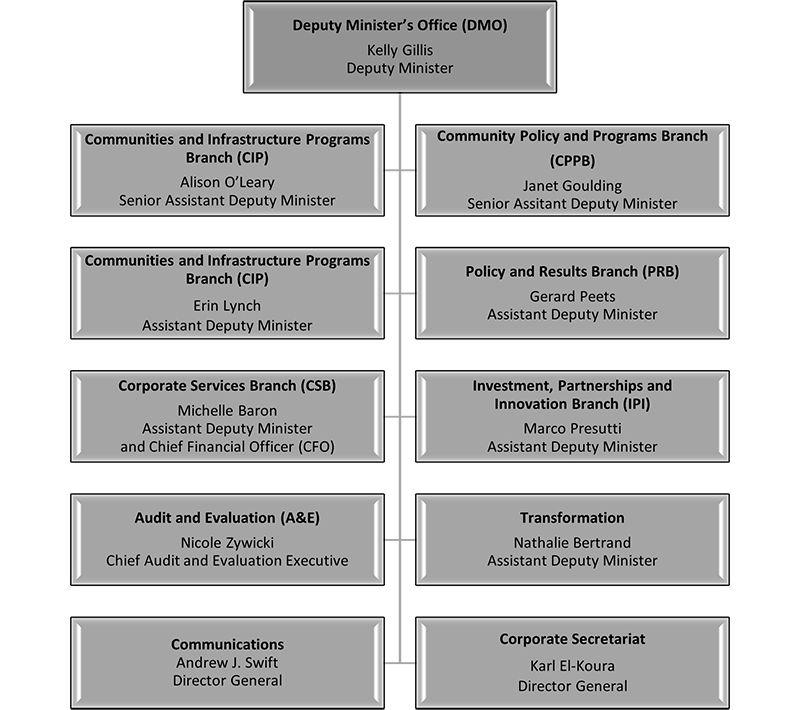Minister of Housing, Infrastructure and Communities Transition Book 1 (2023)
Department and Portfolio Overview
Minister of Housing, Infrastructure and Communities Transition Book 1 (2023)
Department and Portfolio Overview
- Section 1 – Infrastructure Canada
- Section 2 – Portfolio Organizations
Section 1 – Infrastructure Canada
Mandate
Public infrastructure projects help address a wide array of challenges for communities across the country, ranging from the rapid growth of our cities to providing transit options that connect Canadians to employment, services, and recreational opportunities, and from providing support for housing to helping communities cope with climate change and environmental threats to our water and land. Infrastructure Canada provides support to help ensure that Canadians across the country benefit from world-class, modern public infrastructure. To this end, the department makes investments, builds partnerships, develops policies, delivers programs and major projects while also considering alternative models to leverage private investment and participation in the planning and delivery of infrastructure in the public interest.
Infrastructure Canada is a key funding partner for provincial, territorial, municipal, Indigenous, and community partners. The department delivers and manages a broad spectrum of programming, including the Investing in Canada Infrastructure Program, Permanent Public Transit funding, the Disaster Mitigation and Adaptation Fund, the Green and Inclusive Buildings Program, the Canada Community-Building Fund, and the Natural Infrastructure Fund that are delivering new project approvals, as well as delivering a dozen other fully allocated programs.
Infrastructure Canada has recently assumed a leadership role in housing policy for the Government of Canada and works closely with the Canada Mortgage and Housing Corporation (CMHC) to help build stronger communities and better align housing and public infrastructure investments. CMHC leads on the delivery of a comprehensive suite of programming to help make housing more affordable for Canadians – namely the National Housing Strategy. This is a 10 year, $82+ billion plan that promotes inclusion, accountability, participation and non-discrimination. Through the National Housing Strategy, along with federal partners, other orders of government, Indigenous governments and partners, housing providers and stakeholders, CMHC supports the construction and repair of housing, supports the community sector, and improves data, innovation and research all while prioritizing vulnerable populations.
Infrastructure Canada is also responsible for the federal government's response to homelessness in Canada. In particular, it manages Reaching Home: Canada's Homelessness Strategy, which supports the National Housing Strategy's goal of reducing chronic homelessness by 50 percent by 2027-28. Through Reaching Home, the Government of Canada is investing nearly $4 billion over nine years to provide funding to urban, Indigenous, rural and remote communities across Canada to help them address local homelessness needs. Through Reaching Home and other programs, Infrastructure Canada is working with multiple partners from all orders of government (including CMHC), Indigenous partners and not-for-profit organizations to ensure that the homeless-serving sector has adequate support to pursue the prevention and reduction of homelessness.
The Infrastructure Canada portfolio includes two of the largest bridge projects in North America: the Samuel De Champlain Bridge Project and the Gordie Howe International Bridge Project. The Samuel De Champlain Bridge opened to vehicular traffic in early summer 2019, and the Reseau express métropolitain light rail project that traverses the bridge is expected to commence rider service in late July 2023. The Gordie Howe International Bridge is a new international crossing between Windsor, Ontario and Detroit, Michigan, scheduled to open in late 2024.
The Infrastructure Canada portfolio includes responsibilities with respect to five organizations:
The Canadian Mortgage and Housing Corporation (CMHC) is a Crown Corporation and Canada's national housing agency, responsible for promoting housing affordability and a stable housing finance system through project funding, mortgage financing, and research and analysis on Canada's housing market. CMHC is responsible for managing the National Housing Strategy, as described above.
The Canada Infrastructure Bank (CIB) is a federal Crown corporation that leverages federal funding tod collaborate with public partners and private sector investors to deliver complex revenue-generating infrastructure projects in the public interest. The CIB was provided $35 billion in capital through the Canada Infrastructure Bank Act (CIB Act). As of March 31, 2023, the CIB is involved in 46 infrastructure projects, including 42 investments that have reached financial close and 29 in active construction. The CIB is focused on making investments, providing advisory expertise, and building knowledge as a centre of excellence about infrastructure investments.
The Windsor-Detroit Bridge Authority (WDBA) is responsible for the construction and operation of the Gordie Howe International Bridge between Windsor, Ontario, and Detroit, Michigan, which is being delivered through a public-private partnership. The project is also overseen by a binational governance entity known as the International Authority, which has equal representation from Canada and Michigan, and monitors compliance with the Canada-Michigan Crossing Agreement and the Project Agreement with the private partner.
The Jacques Cartier and Champlain Bridges Incorporated (JCCBI) is responsible for managing, operating and maintaining the Jacques Cartier Bridge, the Champlain Bridge, the Bonaventure Expressway, the federal section of the Honoré Mercier Bridge, the Melocheville Tunnel, the deconstruction of the old Champlain Bridge and the Champlain Bridge Ice Control Structure.
Waterfront Toronto is a tri-governmental organization established under provincial legislation as a not-for-profit entity, responsible for leading and implementing the revitalization of over 800 hectares or nearly 2,000 acres of brownfield waterfront lands in Toronto. Its current major project is the Port Lands Flood Protection project. Through an initial joint tri-governmental funding commitment of $1.25 billion announced in 2017, this project will unlock 240 hectares of land for development in the underutilized Port Lands district through innovative flood protection engineering and renaturalization of the mouth of the Don River.
Additional information about the portfolio entities can be found in Section 2.Infrastructure Canada Organizational Information
Infrastructure Canada's budget in 2023-24 is $9. 6 billion, and is comprised of four main elements; namely $173.8 million (of which 50 percent is currently sunsetting in fiscal year 2028-2029) to support the department's operating and capital functions as well as the salary of its 1,169 full-time equivalents (FTEs); $167.6 million allocated to Major Bridges, which is tied specifically to the Samuel De Champlain Bridge Corridor Project and the Gordie Howe International Bridge; $6.9 billion in Grants and Contributions funding, which is used to reimburse claims submitted by recipients; and $2.4. billion in statutory funding for the Canada Community-Building Fund, the Employee Benefit Plan, and Ministerial salary and car allowance.
The department has 76 percent of staff in the National Capital Region and 24 percent staff across the country in all provinces and most territories.
Led by the Deputy Minister of Infrastructure and Communities, the department is served by seven Assistant Deputy Ministers, one Chief Executive, and two Directors General, working in nine functional areas, as outlined below:

Organizational Chart - Text version
- Deputy Minister's Office (DMO)
Kelly Gillis
Deputy Minister- Communities and Infrastructure Programs Branch (CIP)
Alison O'Leary
Senior Assistant Deputy Minister - Community Policy and Programs Branch (CPPB)
Janet Goulding
Senior Assitant Deputy Minister - Communities and Infrastructure Programs Branch (CIP)
Erin Lynch
Assistant Deputy Minister - Policy and Results Branch (PRB)
Gerard Peets
Assistant Deputy Minister - Corporate Services Branch (CSB)
Michelle Baron
Assistant Deputy Minister and Chief Financial Officer (CFO) - Investment, Partnerships and Innovation Branch (IPI)
Marco Presutti
Assistant Deputy Minister - Audit and Evaluation (A&E)
Nicole Zywicki
Chief Audit and Evaluation Executive - Transformation
Nathalie Bertrand
Assistant Deputy Minister - Communications
Andrew J. Swift
Director General - Corporate Secretariat
Karl El-Koura
Director General
- Communities and Infrastructure Programs Branch (CIP)
Deputy Minister's Office
Deputy Minister

Kelly Gillis
Deputy Minister of Infrastructure and Communities
Kelly Gillis was appointed Deputy Minister of Infrastructure and Communities in September 2017.
In this role, Kelly supports the Minister of Intergovernmental Affairs, Infrastructure and Communities, and the Minister of Housing and Diversity and Inclusion.
As Deputy Minister, Kelly oversees the department's contribution to Canada's public infrastructure, housing and homelessness policy and programs—building partnerships, shaping policy and delivering programs and services, including investment in infrastructure that meets a variety of community needs and fosters more inclusive and sustainable Canadian communities.
Prior to accepting her Deputy Minister role, Kelly served as Associate Deputy Minister of Innovation, Science and Economic Development Canada (ISED), helping that department to develop Canada's Inclusive Innovation Agenda and work to build an economy that promotes clean growth, high-quality jobs and increased prosperity.
Kelly has held a number of senior positions within the Government of Canada, notably as Senior Assistant Deputy Minister, Spectrum, Information Technologies and Telecommunications Sector and Chief Financial Officer at ISED.
Kelly holds a Bachelor of Commerce and Graduate Diploma in Public Accounting from McGill University and is a qualified chartered accountant.
Kelly is originally from Montréal and is married with three children.
Deputy Minister's Office – Key Contacts
- Jennifer Eyre – Chief of Staff
- Phillip Monette – Infrastructure and Communities Departmental Liaison
- Brittany Kelly-Sipes – Executive Assistant to the Deputy Minister
Community Policy and Programs Branch
Branch Head

Janet Goulding
Senior Assistant Deputy Minister
The Community Policy and Programs Branch (CPPB) leads the Department's housing policy function. It works closely with the Canada Mortgage and Housing Corporation to advance the Government of Canada's housing priorities, which includes better aligning housing and public infrastructure policies and investments to support compact, complete and inclusive communities. The Branch supports the G7 track of work on Sustainable Urban Development and provides policy advice and programming to support innovative and digitally-enabled communities.
The Branch is also responsible for homelessness policy and research, as well as the design and delivery of federal homelessness programs: Reaching Home: Canada's Homelessness Strategy, which provides direct funding to urban, indigenous, rural and remote communities across Canada to help them address local homelessness needs; and the new Veteran's Homelessness Program, which was launched in Spring 2023.
CPPB – Directorates
- Tara Yetts – Director General, Community Engagement & Service Delivery
- Kris Johnson – Director General, Homelessness Policy Directorate
- Jean Lamirande – Director General, Housing & Community Policy
Policy and Results Branch
Branch Head

Gerard Peets
Assistant Deputy Minister
The Policy and Results Branch (PRB) identifies and assesses broad infrastructure issues, priorities, needs for potential federal action and also contributes to federal policy development. In this capacity, PRB undertakes policy integration and development in areas such as transit policy, resilient and low carbon infrastructure, community infrastructure (e.g. public buildings), water and waste water infrastructure and other emerging issues. The Branch also provides strategic advice to support Ministers at Cabinet and oversees and coordinates Federal, Provincial and Territorial infrastructure meetings.
The Branch is responsible for reporting on results, focusing on data and research to strengthen evidence-based decision-making for all orders of government, and developing a place-based perspective to guide future investments in transit and other infrastructure. PRB is also responsible for delivering the National Infrastructure Assessment.
PRB – Directorates
- Tim Angus – Director General, Strategic and Sectoral Policy
- Sean Keenan – Director General, Economic Analysis and Results
- Lo Chiang Cheng – Director General, Environment Infrastructure Policy
- Saba Khwaja – Director General, National Infrastructure Assessment Secretariat
Communities and Infrastructure Programs Branch
Branch Head

Alison O'Leary
Senior Assistant Deputy Minister

Erin Lynch
Assistant Deputy Minister
The Communities and Infrastructure Programs Branch (CIP) facilitates investment in public infrastructure that benefits all Canadians, through the design, delivery, and performance measurement of a wide array of infrastructure programs.
The branch supports infrastructure projects across the country in collaboration with provinces, territories, municipalities, Indigenous communities and other stakeholders, and provides program-related advice; risk management and analysis; environmental assessments; Indigenous consultation determinations; and program reporting.
Through policy and data analysis, CIP assesses the economic, environmental and social impacts of infrastructure investments across rural and urban communities, with a focus on ensuring that federal investments support the unique needs of rural communities.
CIP – Directorates
- Nathalie Lechasseur – Director General, Program Integration
- Pascal Girard – Director General, Regional Program Operations & Engagement
- Mark Matz – Director General, Public Transit
- Julie Insley – Director General, Integrated Regional Planning
- Paul Loo – Director General, Resilient and Innovative Communities
- Kirsten Mattison – Director General, Rural, Programs Policy, Planning & Reporting
Investment, Partnerships and Innovation Branch
Branch Head

Marco Presutti
Assistant Deputy Minister
The Investment, Partnerships and Innovation (IPI) Branch provides policy leadership, research and expertise to advance alternative and innovative project finance, public-private partnerships and major project delivery.
The Branch is responsible for oversight and support to the Infrastructure Canada's portfolio Crown corporations, including the Canada Infrastructure Bank, the Windsor-Detroit Bridge Authority and the Jacques-Cartier and Champlain Bridges Incorporated as well matters relating to Waterfront Toronto and the Toronto Waterfront Revitalization Initiative.
The Branch also oversees several high-profile, major infrastructure projects being delivered by Infrastructure Canada through public-private partnerships, including: the Samuel De Champlain Bridge Corridor project in Montreal and integration of the Réseau express métropolitain light rail transit system; the Gordie Howe International Bridge project between Windsor and Detroit, Michigan; and supports Transport Canada in the delivery of the High Frequency Rail project between Québec City and Toronto.
IPI – Directorates
- Kathryn McCauley – Acting Director General, Alternative Finance
- Shawn Hibbard – Director General, Major Bridges and Projects
Corporate Services Branch
Branch Head

Michelle Baron
Assistant Deputy Minister and Chief Financial Officer
The Corporate Services Branch (CSB) provides advice, support and services relating to Infrastructure Canada corporate functions, including procurement, human resources, finance, security, planning and administration, accommodations, information management, and information technology.
CSB – Directorates
- Chantal Aubin – Acting Director General, Finance and Administration & Deputy Chief Financial Officer
- Sylvain Campeau – Director General, Human Resources
- Terry Rickan – Chief Information Officer & Director General, Information Management and Information Technology
Transformation Branch
Branch Head

Nathalie Bertrand
Assistant Deputy Minister
The Transformation Branch will help build the Infrastructure Canada of the future by focussing on the following key areas:
- Supporting Infrastructure Canada to prepare for the next generation of infrastructure programming;
- Exploring and implementing new solutions and office technologies that will improve our hybrid work experience in and out of the office;
- Advancing Anti-Racism, Equity and Inclusion (AREI) priorities;
- Establishing Infrastructure Canada's National Footprint; and
- Supporting Infrastructure Canada's first Accessibility Hub to help eliminate barriers for people working with a disability.
Transformation - Directorates
- Michelle Seymour – Director, Anti-Racism, Diversity and Inclusion
- Marie-Josée Lafleur – Director, Accessibility Hub
- Allison Wildgust – Director, Transition and Transformation
Communications
Branch Head

Andrew J. Swift
Director General
The Communications Branch provides advice, planning, and delivery of communications activities and products that support the department's mandate and that inform Canadians on progress and results of federal investments in infrastructure.
Audit and Evaluation
Branch Head

Nicole Zywicki
Chief Executive Audit and Evaluation
The Audit and Evaluation Branch provides independent, evidence-based analysis and insight to senior management on departmental risks and operations to support the effective and efficient achievement of results for Canadians, fostering continuous improvement. The Branch is led by Nicole Zywicki, Chief Audit and Evaluation Executive, who fulfills the dual role of Chief Audit Executive and Head of Evaluation for the department and oversees the Internal Audit and Evaluation Directorates.
The Internal Audit Directorate helps Infrastructure Canada accomplish its objectives by bringing an independent, systematic, disciplined approach to evaluate and improve the effectiveness of risk management, internal control and governance processes. The Evaluation Directorate provides credible and neutral information on the ongoing relevance, effectiveness and efficiency of the department's programs and initiatives to inform evidence-based decision making on policy, expenditure management and program improvements, thus supporting departmental accountability. The Branch is also the department's liaison with the Office of the Auditor General of Canada with respect to performance audits and environmental petitions.
Corporate Secretariat
Branch Head

Karl El-Koura
Director General, Corporate Secretariat
The Corporate Secretariat provides specialized advice and services in support of the Minister(s) and the Deputy Minister for parliamentary affairs, executive correspondence and ministerial and trips and coordination. Within the department, the branch also provides strategic oversight and coordination for internal core Governance and ensures Infrastructure Canada meets its obligations under the Access to Information Act and Privacy Act.
To ensure a single point of access, and to provide oversight and tracking on common issues, the Corporate Secretariat manages the MINO Admin mailbox, which can be used by Ministerial staff to submit questions related to human resources, IT and IM, accommodations, security, and other administrative matters.
Constituting Legal Authorities and Agreements
Minister's legal title
- Minister of Infrastructure and Communities Salaries Act (R.S.C., 1985, c. S-3)& Order in Council (OiC) P.C. 2015-1233
- Minister of Housing and Inclusion, OiC P.C. 2021-0947, 2021-0948 and 2022-0028
Department name
- Office of Infrastructure of Canada, known as Infrastructure Canada, a division or branch of the federal public administration Schedule I.1 Financial Administration Act
Departmental legal authority
- There is no departmental statute/legislation
- Legal authority derives from an OiC P.C. 2004-0325 providing:
Her Excellency the Governor General in Council, on the recommendation of the Prime Minister, hereby authorizes the appropriate Minister, within the meaning of section 2 of the Financial Administration Act, for the Office of Infrastructure of Canada, a department set out in column I to Schedule I.1 of that Act, to enter into transfer payment agreements and contracts related to infrastructure initiatives in Canada.
Sur recommandation du premier ministre, Son Excellence la Gouverneure générale en conseil autorise le ministre compétent - au sens de l'article 2 de la Loi sur la gestion des finances publiques - du Bureau de l'infrastructure du Canada, ministère mentionné à la colonne I de l'annexe I.1 de cette loi, à conclure des accords de paiement de transfert et des contrats pour toute initiative en matière d'infrastructure au Canada.
Legislated programs
- Canada Community-Building Fund – CCBF
- to provide monies to provinces, territories, municipalities, municipal associations, provincial, territorial and municipal entities & First Nations for the purpose of infrastructure
- Keeping Canada's Economy and Jobs Growing Act, S.C. 2011, c. 24, s. 161; replaced by:
- Economic Action Plan 2013 Act, No. 1, S.C. 2013, c. 33, section 233; amended by:
- Budget Implementation Act, 2019, No. 1, paragraph 375(1)(i)
- Budget Implementation Act, 2021, No.1, 2021, c. 23, Division 13, sections 198 & 199
- Canada Strategic Infrastructure Fund – CSIF (legacy fund)
- to provide for the payment of contributions for the carrying out of large-scale strategic infrastructure projects that contribute to economic growth or quality of life in Canada and that advance Canada's objectives with respect to infrastructure
- Designation of responsible Minister, OiC P.C.2015-1235
- Canada Strategic Infrastructure Fund Act, 2002, c. 9, s. 47
Bridges
Transfers from the Department of Transport to the Office of Infrastructure of Canada the control and supervision of the bridges, OiC P.C. 2014-0144
- New Bridge for the St. Lawrence Corridor Project (NBSL) – (Samuel de Champlain Bridge Corridor)
- Designation of the Minister for the purposes of the New Bridge for the St. Lawrence Act, OiC P.C. 2015-1242
- New Bridge for the St. Lawrence Act, S.C. 2014, c. 20, s. 375
- Gordie Howe International Bridge Project (GHIB)
- Crossing Agreement between Her Majesty the Queen in Right of Canada and the State of Michigan and the Crossing Authority, dated June 15, 2012
- Bridge to Strengthen Trade Act, S.C. 2012, c. 31, s. 179
- Transfers to the Minister of Infrastructure, the powers, duties and functions under the Bridge to Strengthen Trade Act, OiC P.C. 2015-1238
- International Bridges and Tunnels Act, S.C. 2007, c.1, section 29
Portfolio Organizations – Crown corporations / other entities:
Crown corporations:
- Canada Mortgage and Housing Corporation (CMHC)
- Order Designating the Minister of Housing and Diversity and Inclusion as the Minister for the Purposes of the CMHC Act, SI/2021-92
- Order Designated the Minister of Housing and Diversity and Inclusion as the Minister for the Purposes of the National Housing Strategy Act, SI/2021-93
- Order Designating the Minister of Housing and Diversity and Inclusion as the Minister for the purposes of the National Housing Act, SI/2021-94
- Canada Mortgage and Housing Corporation Act, R.S.C, 1985, c. C-7
- National Housing Act, R.S.C., 1985, n. N-11
- National Housing Strategy Act, S.C., 2019, c. 29, s. 313
- Part X of the Financial Administration Act
- Canada Infrastructure Bank (CIB)
- Designation of the Minister for the purposes of the CIB Act, OiC P.C. 2017-1007
- Canada Infrastructure Bank Act, S.C. 2017, c. 20, s. 403;
- Part X of the Financial Administration Act
- Windsor-Detroit Bridge Authority (WDBA)
- Designation of the Minister as the appropriate Minister for the WDBA, OiC P.C. 2015-1237
- Letters Patent of incorporation for the establishment of the WDBA:
- Letters Patent, dated October 9, 2012, OiC P.C. 2012-1350, Canada Gazette
- Supplementary Letters Patent, dated August 10, 2017, OiC P.C. 2017-1053
- Transfers to the Minister of Infrastructure the powers, duties and functions under the Letters Patent except any power, duty or function under s.9.1 of the Letters Patent, OiC P.C. 2015-1236
- Part X of the Financial Administration Act
- Jacques-Cartier and Champlain Bridge Inc. (JCCBI)
- Designation of the Minister as the appropriate Minister for the JCCBI, OiC P.C. 2015-1241
- Canada Business Corporation Act, R.S.C., 1985, c. C-44
- Part X of the Financial Administration Act
- The Jacques-Cartier and Champlain Bridges Inc. Regulations (SOR 98-568), made pursuant to section 141 of the Canada Marine Act
Other shared governance entity:
- Toronto Waterfront Revitalization Corporation (TWR)
- Designation of the Minister to represent Her Majesty in right of Canada for the purposes of the Toronto Waterfront Revitalization Corporation Act, OiC P.C. 2015-1240
- Designation of the Minister for matters relating to the activities of the federal government with respect to Waterfront Toronto and includes the power to enter into transfer payment agreements and contracts for the acquisition of services, OiC P.C. 2015-1239
- Toronto Waterfront Revitalization Corporation Act, S.O. 2002, c.28
Section 2 – Portfolio Organizations
The Minister of Infrastructure and Communities has responsibilities over five arm's length organizations:
- Canada Mortgage and Housing Corporation (CMHC)
- The Canada Infrastructure Bank (CIB)
- The Windsor-Detroit Bridge Authority (WDBA)
- The Jacques Cartier and Champlain Bridges Incorporated (JCCBI)
- Waterfront Toronto
Each organization has a unique mandate and organizational structure. In accordance with their enabling legislation, the Minister of Infrastructure and Communities exercises varying degrees of responsibility for the organizations within the portfolio.
More detailed information on each portfolio organization follows.
Canada Mortgage and Housing Corporation
Leadership

Derek Ballantyne
Chair of the Board of Directors

Romy Bowers
President and Chief Executive Officer
Corporate Information
Organization Type: Crown Corporation
Incorporation: Canada Mortgage and Housing Act; National Housing Act
Year Incorporated: Established in 1946
Head Office: Ottawa, ON
Website: www.cmhc-schl.gc.ca
Mandate, Mission and Description
- CMHC is a Crown Corporation and Canada's national housing agency, responsible for promoting housing affordability and a stable housing finance system through project funding, mortgage financing, and research and analysis on Canada's housing market.
- CMHC's mandate, as defined in the National Housing Act, is to: "promote housing affordability and choice, to facilitate access to, and competition and efficiency in the provision of housing finance, to protect the availability of adequate funding for housing at low cost, and generally contribute to the well-being of the housing sector in the national economy."
- The statutory objectives for CMHC's commercial operations are further specified in the National Housing Act as follows:
- to promote the efficient functioning and competitiveness of the housing finance market;
- to promote and contribute to the stability of the financial system, including the housing market; and,
- to have due regard to the Corporation's exposure to loss.
Governance
Stewardship of CMHC is the responsibility of the Board of Directors, which is comprised of the Chairperson, the President and Chief Executive Officer; the Deputy Minister of the Minister for CMHC; the Deputy Minister of Finance; and eight other directors.
The Chair and the President and Chief Executive Officer are appointed by the Governor in Council. The Deputy Minister of the Minister for CMHC and the Deputy Minister of Finance are appointed based on the office they each hold. The eight other directors are appointed by the Minister designated for the purposes of the Canada Mortgage and Housing Act and the National Housing Act with Governor in Council approval. With the exception of the President and Chief Executive Officer, all members of the Board are independent of CMHC Management.
Canada Infrastructure Bank
Leadership

Tamara Vrooman
Chair of the Board of Directors

Ehren Cory
Chief Executive Officer
Corporate Information
Organization Type: Crown Corporation (FAA, Sched. III, Part I)
Incorporation: Canada Infrastructure Bank Act
Year Incorporated: 2017
Head Office: Toronto, ON
Website: www.cib-bic.ca
Mandate, Mission and Description
- The Canada Infrastructure Bank (CIB) is a Crown corporation that reports to Parliament through the Minister of Infrastructure and Communities.
- The CIB is leveraging $35 billion to attract private capital and co-invest with private-sector and institutional investors in new, revenue-generating infrastructure. The CIB is expected to manage to a maximum fiscal expense of $15 billion.
- Building on Canada's strong Public-Private Partnership model, the CIB was established to ensure that Canadians benefit from modern and sustainable infrastructure through partnerships between governments and the private sector. It does this through its core responsibilities to provide advisory services, undertake research and invest in projects that leverage private and institutional capital to deliver infrastructure that achieves public outcomes and value for taxpayers.
- Working cooperatively with provincial, territorial, municipal, federal, Indigenous and private sector investor partners, the Bank aims to transform the way infrastructure is planned, funded and delivered in Canada by:
- engaging private sector partners early in the planning and design process;
- advancing revenue-based business models, where appropriate; and
- exploring new and innovative approaches to project finance and delivery.
Governance
The CIB's Board is responsible for the organization's ongoing governance and supervision of its business, final investment decisions, and forward-planning and strategic direction, in line with the Government of Canada's priorities.
The CIB's Board is composed of the Chairperson and no fewer than eight but no more than eleven directors, and each is to be appointed by the Governor in Council.
Windsor-Detroit Bridge Authority
Leadership

Tim Murphy
Chair of the Board of Directors

Charl Van Niekerk
Chief Executive Officer
Corporate Information
Organization Type: Crown Corporation (FAA, Sched. III, Part I)
Incorporation: Established by Letters Patent pursuant to subsection 29(1) of International Bridges and Tunnels Act; P.C. Order-in-Council 2012-1350
Year Incorporated: 2012
Head Office: Windsor, ON
Website: www.gordiehoweinternationalbridge.com
Mandate, Mission and Description
- Windsor-Detroit Bridge Authority (WDBA) is a Crown corporation that reports to Parliament through the Minister of Infrastructure and Communities.
- WDBA is responsible for the delivery of the Gordie Howe International Bridge project between Windsor, Ontario and Detroit, Michigan, through a public-private partnership (P3). As one of the largest P3 projects in North America, the project comprises a six-lane cable-stayed bridge between Windsor and Detroit; a Canadian Port of Entry; a U.S. Port of Entry; and an interchange connecting the U.S. Port of Entry to Michigan Interstate 75 (I-75).
- The WDBA is responsible for project oversight of the construction and the operation of the new crossing. As the operator of the new bridge, WDBA will set and collect all tolls.
- The project is a vital investment in the Canadian economy, and will facilitate increased trade capacity between Canada and the United States by providing redundancy and highway-to-highway connectivity at Windsor-Detroit – the busiest commercial land border crossing between Canada and the United States.
Governance
The WDBA Board is responsible for overseeing the business activities, forward planning and strategic direction as aligned with the Government of Canada's priorities.
The WDBA's Board is composed of the Chairperson, the CEO and up to seven directors. The directors are appointed by the Minister with the approval of the Governor in Council (GiC). The Chairperson and the CEO are appointed by the GiC.
In addition, the International Authority is a joint Canada-Michigan governance entity responsible for monitoring compliance of WDBA with the Crossing Agreement signed by Canada and Michigan. The International Authority consists of six members with equal representation from Canada and Michigan. Two members are appointed by Canada, one appointed by WDBA and three appointed by Michigan.
Jacques Cartier and Champlain Bridges Incorporated
Leadership
[Redacted]
Catherine Lavoie
Chair of the Board of Directors
[Redacted]
Sandra Martel
Chief Executive Officer
Corporate Information
Organization Type: Crown Corporation (FAA, Sched. III, Part I)
Incorporation: Canada Business Corporations Act
Year Incorporated: JCCBI was established on November 3, 1978, and was a wholly owned subsidiary of the St. Lawrence Seaway Authority until 1998 when it became a wholly owned subsidiary of the Federal Bridge Corporation Limited. In 2014, JCCBI became a parent Crown corporation reporting to the Minister of Infrastructure and Communities.
Head Office: Longueuil, QC
Website: www.jacquescartierchamplain.ca
Mandate, Mission and Description
- The Jacques Cartier and Champlain Bridges Incorporated (JCCBI) is a Crown corporation that reports to Parliament through the Minister of Infrastructure and Communities.
- It oversees the management, maintenance and rehabilitation of two bridges and their approaches, namely the Jacques Cartier Bridge and the federal portion of the Honoré Mercier Bridge, while also being responsible for the deconstruction of the original Champlain Bridge. It is also responsible for three related infrastructures, namely the federal section of the Bonaventure Expressway, the Champlain Bridge Ice Control Structure and the Melocheville Tunnel. These structures play a vital role in the regional transportation system and economy.
- The JCCBI's mission is to ensure the mobility of users, the safety and the longevity of infrastructure using a systematic approach based on sustainable development.
- The Corporation plays a vital role in the daily life of thousands of users whose modes of transportation are constantly evolving. As an island city, Montréal depends on bridges to ensure the passage and mobility of goods and people.
Governance
The JCCBI Board is responsible for the organization's ongoing governance and supervision of its business, final investment decisions, and forward-planning and strategic direction, as aligned with federal priorities.
The JCCBI's Board is composed of the Chairperson, the CEO and up to five directors. The directors are appointed by the Minister with the approval of the Governor in Council (GiC) and the Chairperson, and the CEO are appointed by the GiC.
Waterfront Toronto
Leadership

Jack Winberg
Interim Chair of the Board of Directors

George Zegarac
Chief Executive Officer
Corporate Information
Organization Type: Tri-Government Organization
Incorporation: Toronto Waterfront Revitalization Corporation Act
Year Incorporated: Established in 2001
Head Office: Toronto, ON
Website: www.waterfrontoronto.ca
Mandate, Mission and Description
- Waterfront Toronto (formerly the Toronto Waterfront Revitalization Corporation) is a tri-governmental organization. It was established in 2001 and continued under provincial statute in 2003 following the commitment of $500 million each in seed funding by the Governments of Canada, Ontario, and Toronto.
- Waterfront Toronto has a 25-year mandate (2003-2028) to transform 800 hectares of brownfield lands on Toronto's waterfront into beautiful, inclusive and sustainable communities and dynamic public spaces. Ongoing projects include the Port Lands Flood Protection project, jointly funded by all three levels of government and one of the largest infrastructure projects in North America. Other key initiatives include the privately-procured Quayside Development Opportunity, which is set to transform 12.5 acres of post-industrial lakefront land into a dynamic, inclusive and resilient new community.
Governance
Waterfront Toronto's oversight and strategic direction is provided through three forums: an independent Board of Directors, an Intergovernmental Steering Committee composed of high-ranking government officials, and the Port Lands Executive Steering Committee.
Waterfront Toronto's Board of Directors is composed of a Chairperson and 12 other members – four each appointed by the Government of Canada, the Province of Ontario, and the City of Toronto. The Minister of Infrastructure and Communities is responsible for appointing up to four federal directors to the board through Ministerial appointment processes.
The Chairperson of the board is selected from the existing board composition, and can be chosen either through tri-governmental agreement or through majority board vote, as permitted by the corporation's enabling legislation. In the case of tri-governmental agreement, all three partners must appoint the chosen Chairperson through their formal appointment processes to give effect to the Chair's term. Waterfront Toronto issues both an Annual Report and an Integrated Annual Report and solicits tri-governmental feedback for both, however neither one requires federal approval.
Report a problem on this page
- Date modified: